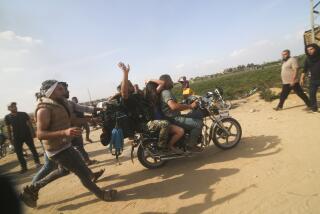U.N. Panel Finds Evidence of Serb War Crimes : Balkans: Policies of ‘ethnic cleansing’ and rape were ‘particularly brutal,’ report says.
- Share via
UNITED NATIONS — The U.N. commission on Balkan war crimes issued its final report Wednesday, saying that strong evidence in the former Yugoslav federation indicates that Serbian commanders violated international law by pursuing deliberate policies of “ethnic cleansing” and rape.
“The crimes committed have been particularly brutal and ferocious in their execution” and “the magnitude of victimization is clearly enormous,” the commission said.
It said the “ethnic cleansing” and sexual assaults were carried out so systematically--with no effort by authorities to stop or punish offenders--that members of the commission believe that “command responsibility can be established.”
The commission, headed by Cherif Bassiouni, an Egyptian-born professor of law at De Paul University in Chicago, turned over its findings and its files to the United Nations’ International Tribunal on war crimes in the former Yugoslav republics, headquartered in The Hague.
The tribunal, which is supposed to indict and put on trial those accused of war crimes in Bosnia-Herzegovina and other parts of the former Yugoslav federation, has been slow in organizing itself. Its first prosecutor resigned before even taking office. The U.N. Security Council has not yet named a replacement.
In its report, the commission urged the tribunal to act. Victims, the panel said, had “high expectations that this commission will establish the truth and that the (tribunal) will provide justice.”
The commission also said that, although the victimization was clearly ordered by commanders, the perpetrators--most but not all of them Serbs--had no right to defend themselves by claiming they had to obey their superiors’ orders.
The command-and-control structure in Bosnia was so loose, the commission said, that “unlawful orders could have been disobeyed without individuals risking personal harm.”
“Indeed, some did,” the commission went on. “A moral choice existed.”
Discussing “ethnic cleansing”--the practice of clearing an area of its non-Serbian population--the commission said it was carried out “with extreme brutality and savagery in a manner designed to instill terror in the civilian population, in order to cause them to flee and never to return.” The weapons included mass murder, rape, torture, looting and property destruction.
Studying in detail one district--northwest Bosnia’s Opstina Prijedorin--the commission found that its Muslim population had declined from 49,454 in 1991 to 6,124 in 1993. Counting Croats and others, the commission concluded that 52,811 people had been killed or deported in “ethnic cleansing” in that district.
Listing names of possible guilty parties, the commission said the military destruction of non-Serbian houses in the district occurred when it was under the command of Col. Vladimir Arsio and Maj. Radmilo Zeljaja. Further, the commission said, it “possesses the names of hundreds of alleged perpetrators at different levels and in a variety of capacities.”
Discussing the siege of Sarajevo, the commission concluded there is no doubt that Bosnian Serbs deliberately targeted the civilian population in months of shelling--a violation of international law.
“Whether or not it is possible to develop a firm case against individual soldiers or unit commanding officers,” the report said, “it should be quite practicable to develop a prima facie case against the officer or officers responsible for the (Bosnian Serb) forces which have been surrounding Sarajevo from the beginning of the siege.”
Not all the evidence pointed to Serbian guilt. In one section of its report, the commission described a Croatian attack on Serbs in a collection of small villages and hamlets known as the Medak pocket. U.N. investigators found an “obvious and overwhelming pattern of wanton destruction: hundreds of homes were destroyed . . . most animals were killed or taken, virtually all personal property was destroyed or taken. . . . Devastation was total.”
This destruction was “not of military necessity” and “occurred well after all Serb resistance had ended,” the commission said.
The report said that commissioners believe that a case can be developed against senior Croatian officers for the wanton destruction.
In its discussion of detention camps operated by all sides in the war, the panel concluded that “grave breaches . . . of international humanitarian law have been committed over a long period of time, on a large scale, and very frequently in the most brutal, inhuman and degrading manner.
“These violations,” the report goes on, “are ordered by or known to the camp commanders, the local political leadership and police. Army units may or may not be involved. However, they do not intervene to stop these violations, thereby implying responsibility by omission.”
The commission said that most of the rapes were committed by Serbs against Muslims, and, while some were the result of random individual or small-group conduct, “many more seem to be part of an overall pattern.”
The panel found a large number of mass graves, many situated near the detention camps. It concluded that at least 99 of the sites “appear to contain victims of mass killings.”
In a section on destruction of cultural property, the commission accused the Croats of destroying the Mostar Bridge and the Serbs of destroying large sections of the old Croatian town of Dubrovnik for no apparent military reason.
More to Read
Sign up for Essential California
The most important California stories and recommendations in your inbox every morning.
You may occasionally receive promotional content from the Los Angeles Times.













